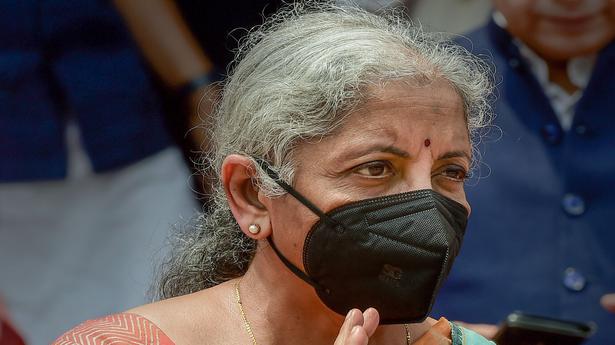To boost spending, Centre releases ₹1.16 lakh crore to States
Two months’ tax dues remitted in one go to ease States’ fiscal constraints after GST compensation sunset
Two months’ tax dues remitted in one go to ease States’ fiscal constraints after GST compensation sunset
The Centre on Wednesday released over ₹1.16 lakh crore to States, equivalent to two monthly instalments of tax devolution, to help front-load State governments’ capital spending abilities in this financial year.
Coming soon after the expiry of the assured Goods and Services Tax (GST) compensation to States from this July, economists expect the move to give States’ twice the monthly share of net proceeds of union taxes and duties for August will bolster their cash flows and nudge them into planning and executing capex outlays.
The development also assumes significance as some Chief Ministers raised concerns about their dwindling resources and sought more funds from the Centre through extension of the GST compensation period and a higher share in the divisible pool of taxes, at NITI Aayog’s governing council meeting chaired by Prime Minister Narendra Modi on August 7.
As against a ‘normal monthly devolution’ of ₹58,332.86 crore, the Finance Ministry said an amount of ₹1,16,665.75 crore had been released ‘in line with the commitment of the Government of India to strengthen the hands of States to accelerate their capital and developmental expenditure’.
‘Buoyant revenues’
“Tax revenues have been buoyant so this is a good move from the Centre to provide an incentive for States to push discretionary spending, which is largely on capital investment projects,” Bank of Baroda chief economist Madan Sabnavis noted.
“In the last two years, we have seen States hold back a bit on such spending to meet their committed expenses such as salaries and pensions first. With more funds at their disposal now, they can consider such discretionary spends,” he said, adding that such front-loading of tax devolutions might not recur in the coming months.
In 2021-22, a large part of the upside in tax devolution was paid out to States in the fourth quarter of the year, which ended up reducing State government borrowings for that period but did not translate to higher spending.
Rating agency ICRA anticipates the Central tax devolution to be ‘as large as’ ₹9.3 lakh crore this year, compared to the ₹8.2 lakh crore estimated in the Budget, on the back of higher non-excise tax revenues. It estimated that a total of ₹3.18 lakh crore has been devolved to States in the first five months of this year, about 39% of Budget estimates.
The higher-than-expected Central tax devolution this year warrants an early reassessment of the monthly amounts being shared with the States to enable them to boost their capital spending, given the lead time required to plan and execute such projects, the firm had noted earlier.
Monthly share up
The latest devolution indicates the Centre has raised the monthly share for States significantly from about ₹48,000 crore that was shared with them in April.
“The assessed amount released so far works out to 34% of our estimate for tax devolution for 2022-23, and marks a sizeable 49% growth over the corresponding period of last year,” said ICRA chief economist Aditi Nayar.
Earlier, on May 31, the Centre had released GST compensation dues of about ₹87,000 crore to States for April and May, even though GST compensation cess accruals at the time were just ₹25,000 crore.
The Finance Ministry had said this was also aimed at assisting the States in managing their resources and ensuring that their programmes, especially the expenditure on capital is carried out successfully during the financial year.
States are now owed ₹35,266 crore on account of GST compensation for June 2022, the last month for which States were promised assured revenues as part of the compact to transition to the GST regime in 2017. The Finance Ministry has said those dues will be paid from collections of the GST compensation cess, whose levy has been extended till March 31, 2026.
For all the latest business News Click Here

